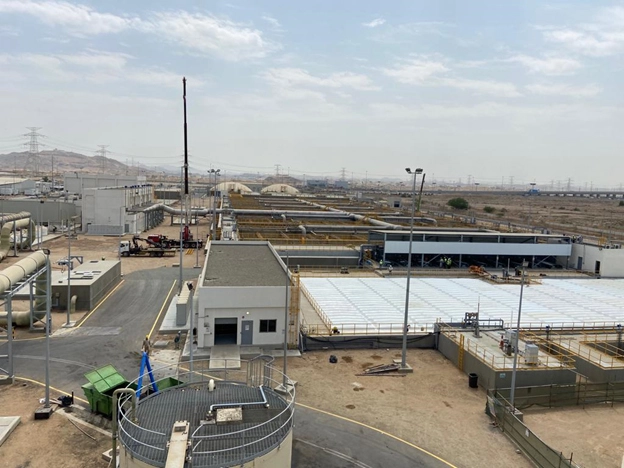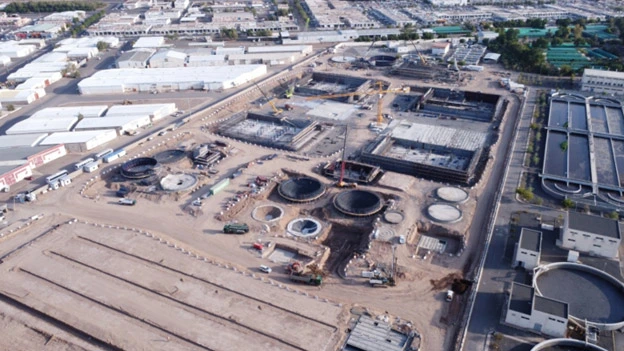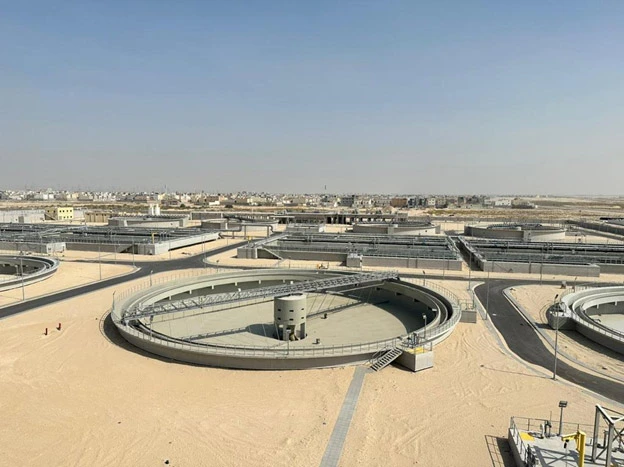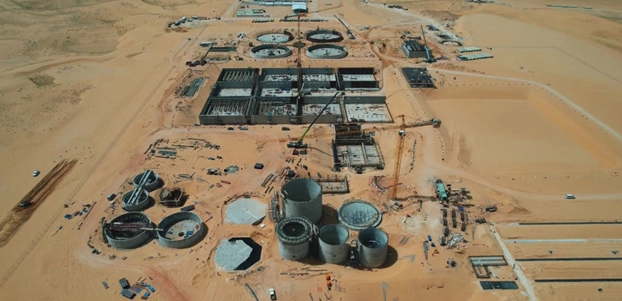
Top 5 Waste Water Treatment Plants in Saudi Arabia
Table of Contents
Water Treatment Plants in Saudi Arabia treat about 50% of the total wastewater. As a part of the Kingdom’s Vision 2030, Saudi aims to achieve 100% reuse of treated wastewater by 2025. This initiative includes constructing and operating several water treatment plants and expanding the total wastewater treatment capacity.
The Gulf State Analytics estimates Saudi Arabia's water reuse market to be the third largest in the World after China and the US, with a value of USD 4.69 Billion. Through advanced STP technologies, Saudi Arabia is expanding its water supply systems. Let us explore the latest top five wastewater treatment plants in Saudi Arabia.
Top Waste Water Treatment plants in Saudi Arabia
| Project | Capacity | Location | Developer | Cost (Million SAR) | Commissioned Year |
| Jeddah Airport 2 ISTP | 500,000 m³/day | Jeddah, Red Sea coast | Marafiq, Alamwal Al-Khaleejiah Al-Thaniya, Veolia Middle East | 845 Million SAR (USD 228.15 Million) | 2024 |
| Madinah-3 WWTP | 200,000 m³/day | Medina | ACCIONA | 964 Million SAR (USD 260.2 Million) | 2024 |
| Dammam WWTP | 200,000 m³/day | Dammam, Eastern Province | Metito, Mowah Co, Orascom Construction | 845 Million SAR (USD 228.15 Million) | 2023 |
| Buraidah-2 WWTP | 150,000 m³/day | Buraidah | Acciona Agua, Tamasuk, International Water Distribution Co. Ltd. | 845 Million SAR (USD 228.15 Million) | 2024 |
| Taif WWTP | 100,000 m³/day | Taif, Makkah Province | Cobra, Tawzea | 320 Million SAR (USD 86.4 Million) | 2023 |
Jeddah Airport 2 Independent Sewage Treatment Project
The Jeddah Airport 2 Independent Sewage Treatment Project (ISTP) is a major initiative by the Saudi Water Partnership Company (SWPC) to enhance wastewater treatment capacity in the region. The new plant will be near the existing Jeddah Airport 1 treatment facility on the Red Sea coast. It is designed with Nereda technology (biological waste treatment technology that uses activated sludge or biomass) to handle a maximum treatment capacity of 500,000 cubic meters daily.
This sewage treatment project is part of a broader strategy to integrate and upgrade existing wastewater infrastructure, including the potential acquisition, renovation, and operation of the Jeddah Airport 1 facility, which currently has a capacity of 250,000 cubic meters per day with an additional 100,000 cubic meters per day.

The development, financing, design, construction, operation, and maintenance of the Jeddah Airport 2 ISTP will be managed by Marafiq in collaboration with Alamwal Al-Khaleejiah Al-Thaniya and Veolia Middle East under a 25-year concession agreement. This wastewater treatment plant is built under the Build-Own-Operate-Transfer (BOOT) model and includes the complete handling of wastewater supplied by the National Water Company. The total project cost is 845 Million SAR (USD 228.15 Million). The levelized cost is 0.836 SAR/m3 (USD 0.2257/m3).
Read: SWPC Starts the Construction of $680 Million Rabigh Independent Water Plant in Saudi Arabia
Madinah-3 Wastewater Treatment Plant
The Madinah-3 Wastewater Treatment Plant (WWTP), constructed by ACCIONA, is located in Medina, Saudi Arabia. It will serve over 1.1 million residents and has an initial treatment capacity of 200,000 m³/day, expandable to 375,000 m³/day. Under a 25-year BOOT/EPC contract, the project includes building 23 km of recycled water collectors, storage tanks, and pumping stations. Madinah-3 is part of a larger initiative involving three WWTPs, collectively treating 440,000 m³/day, benefiting 2.1 million people, with a total investment of 964 Million SAR (USD 260.2 Million).

The technology used here is the LUCAS (Laser Utilizing Communication System that connects Earth satellites with data relay satellites), and this project's levelized cost is 1.198 SAR/m3 (USD 0.323/m3). The project developers and operations & maintenance are under Tamasuk, International Water Distribution Co. Ltd., and Acciona Agua. The project’s commercial operation date is in 2024.
Dammam Wastewater Treatment Plant
The Dammam Wastewater treatment plant is built with 200,000 m3 per day, which is expandable to 350,000 m3/day. This project is built in the Dammam region in the Eastern Province of the Middle East under a BOOT contract by a Metito, Mowah Co, and Orascom Construction consortium.

About 26 companies, including AI Yamama Company, International Water Distribution Company TAWZEA, Lamar Holding W.L.L., and China Railway Construction Co.LTD, expressed interest in the Dammam West ISTP Outfall pipeline. It is built using the MBBR technology (Moving bed biofilm reactor in which microorganisms are used to decompose organic waste) at a project cost of 845 Million SAR (USD 228.15 Million) at a levelized cost of 1.153 SAR/m3 (USD 0.31131/m3).
Find GCC STP Project & Tender Leads! Claim Your Free Leads Now!
Buraidah 2 Wastewater Treatment Plant
The WWTP Buraidah-2 project is located in Buraidah, Saudi Arabia, and is a wastewater treatment plant. It is designed to serve drinking water to a population equivalent to 600,000 inhabitants and has a treatment capacity of 150,000 m³/day. The project includes primary and secondary treatment processes and tertiary treatment through a reverse osmosis system for water reuse.

Using the LUCAS technology, this water treatment plant was built by a consortium of Acciona Agua, Tamasuk, and International Water Distribution Co. Ltd. The scheduled construction is completed under a BOOT contract by Q4 of 2023, and the project will begin its commercial operations in 2024. The project cost is 845 Million SAR (USD 228.15 Million). The levelized cost is 1.35 SAR/m3.
Read: LG Chem to Build a Water Desalination Device Plant in Saudi Arabia
Taif Wastewater Treatment Plant
The Taif Wastewater Treatment Plant was built in Taif, Makkah Province, with a capacity of 100,000, expandable to 270,000 m3/day. Using SBR technology (Sequential Batch Reactors), a sludge-activated system controls the organic matter in wastewater.
They were built under a BOOT contract by the Saudi Water Partnership Company (SWPC) and the consortium of Cobra and Tawzea. Cobra and International Water Distribution Company (Tawzea) is awarded the finance, engineering, implementation, construction, procurement, and ownership. The plant construction schedule will be completed by Q3 of 2022, and operation of this plant will begin in Q1 of 2023. The first phase of the sewage treatment plant will produce 100,000 cubic meters per day. The second phase, with an additional capacity of 170,000/m3, will be added if the existing usage rates exceed. This project is part of the Kingdom’s 2030 Vision. The project financing cost SAR 320 million (USD 86.4 million) and was funded by a local bank.
Current and Future Scope of Waste Water Treatment Plants in Saudi Arabia
Different cities in Saudi Arabia contribute to the National Water Company by providing clean drinking water and ensuring water security. According to NCBI, in Damman city, 78% of the wastewater is treated, whereas, in Riyadh capital city, 60% of the wastewater is treated, and in Jeddah, only 50% is treated.
Saudi Arabia allocated USD 6.28 billion, mainly for water distribution. This includes water treatment plants and wastewater treatment plants. As a part of this, SWCC has initiated plans to improve sewage treatment plants and the desalination sector.
Read: Top 5 Desalination Plants in Saudi Arabia
MEWA (Ministry of Environment, Water and Agriculture of Saudi Arabia) aims to meet Saudi Arabia's water demand by upto 90% through desalinated water and reusing treated wastewater. SWPC plans to bridge the gap through strategic storage, advanced technologies, and improved water treatment plants. To meet the supply and demand, Saudi Arabia plans to mandate the usage of renewable energy.
Find GCC STP Project & Tender Leads! Claim Your Free Leads Now!
Conclusion
Saudi Arabia is making significant strides in enhancing its water resources and treatment infrastructure by constructing and operating advanced wastewater treatment and desalination plants. Implementing cutting-edge technologies like Nereda and LUCAS improves water quality and provides a reliable potable and treated water supply. Other initiatives include the integration of recycled water collectors, sand filters, and advanced desalination that supports the reuse of treated sewage effluent for irrigation and other non-potable applications.
By investing in water infrastructure and innovative water purification and treatment technologies, Saudi Arabia aims to achieve its ambitious goals outlined in the Kingdom’s Vision 2030. As Saudi Arabia continues to prioritize water desalination and wastewater treatment projects, it positions itself as a global leader in water resource management, providing sustainable water sources for the well-being of its citizens and sustainable development.
FAQ’s
How does Saudi Arabia purify water?
Saudi Arabia purifies its salinated water through desalination and wastewater through advanced sewage treatment plants.
How many water treatment plants does Saudi Arabia have?
About 204 water treatment plants in Saudi Arabia contribute to the water security strategy of the Kingdom’s Vision 2030.
Collaborate with decision-makers on Sewage Treatment Plant (STP) projects across GCC for business opportunities.
Subscribe to our Sewage Treatment Plant (STP) projects GCC database and receive exclusive benefits like
- Regular updates on Sewage Treatment Plant (STP) projects and tenders
- Exclusive Access to our Sewage Treatment Plant (STP) Projects Global Database
- In-progress and Completed Sewage Treatment Plant (STP) Projects
- Essential details, Timely Updates, Key Stakeholder Contact Information
- Industry Trends and insights by experts
Start a free demo to take your business to the next level!



Leave a Comment
We love hearing from our readers and value your feedback. If you have any questions or comments about our content, feel free to leave a comment below.
We read every comment and do our best to respond to them all.